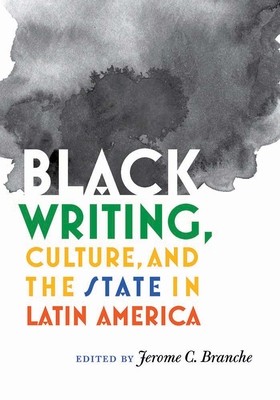
- We will send in 10–14 business days.
- Publisher: Vanderbilt University Press
- ISBN-10: 0826520634
- ISBN-13: 9780826520630
- Format: 14.9 x 27.9 x 1.8 cm, minkšti viršeliai
- Language: English
- SAVE -10% with code: EXTRA
Black Writing, Culture, and the State in Latin America (e-book) (used book) | bookbook.eu
Reviews
Description
Imagine the tension that existed between the emerging nations and governments throughout the Latin American world and the cultural life of former enslaved Africans and their descendants. A world of cultural production, in the form of literature, poetry, art, music, and eventually film, would often simultaneously contravene or cooperate with the newly established order of Latin American nations negotiating independence and a new political and cultural balance. In Black Writing, Culture, and the State in Latin America, Jerome Branche presents the reader with the complex landscape of art and literature among Afro-Hispanic and Latin artists. Branche and his contributors describe individuals such as Juan Francisco Manzano, who wrote an autobiography on the slave experience in Cuba during the nineteenth century. The reader finds a thriving Afro-Hispanic theatrical presence throughout Latin America and even across the Atlantic. The role of black women in poetry and literature comes to the forefront in the Caribbean, presenting a powerful reminder of the diversity that defines the region.
All too often, the disciplines of film studies, literary criticism, and art history ignore the opportunity to collaborate in a dialogue. Branche and his contributors present a unified approach, however, suggesting that cultural production should not be viewed narrowly, especially when studying the achievements of the Afro-Latin world.EXTRA 10 % discount with code: EXTRA
The promotion ends in 22d.15:00:28
The discount code is valid when purchasing from 10 €. Discounts do not stack.
- Publisher: Vanderbilt University Press
- ISBN-10: 0826520634
- ISBN-13: 9780826520630
- Format: 14.9 x 27.9 x 1.8 cm, minkšti viršeliai
- Language: English English
Imagine the tension that existed between the emerging nations and governments throughout the Latin American world and the cultural life of former enslaved Africans and their descendants. A world of cultural production, in the form of literature, poetry, art, music, and eventually film, would often simultaneously contravene or cooperate with the newly established order of Latin American nations negotiating independence and a new political and cultural balance. In Black Writing, Culture, and the State in Latin America, Jerome Branche presents the reader with the complex landscape of art and literature among Afro-Hispanic and Latin artists. Branche and his contributors describe individuals such as Juan Francisco Manzano, who wrote an autobiography on the slave experience in Cuba during the nineteenth century. The reader finds a thriving Afro-Hispanic theatrical presence throughout Latin America and even across the Atlantic. The role of black women in poetry and literature comes to the forefront in the Caribbean, presenting a powerful reminder of the diversity that defines the region.
All too often, the disciplines of film studies, literary criticism, and art history ignore the opportunity to collaborate in a dialogue. Branche and his contributors present a unified approach, however, suggesting that cultural production should not be viewed narrowly, especially when studying the achievements of the Afro-Latin world.

Reviews